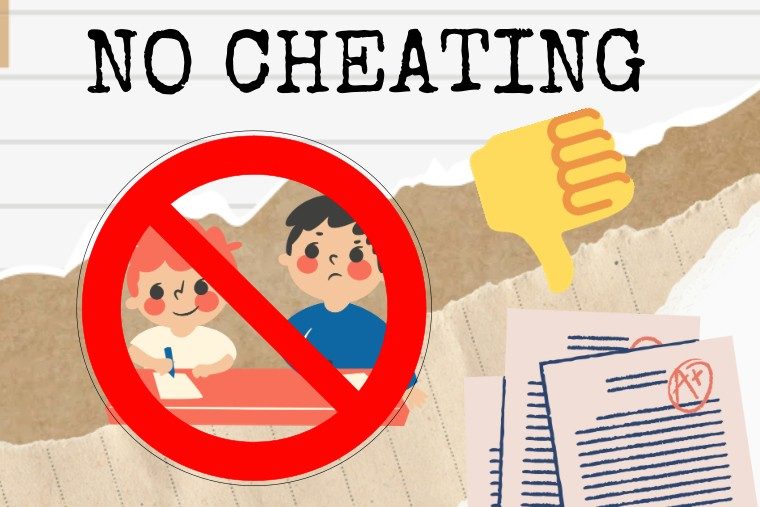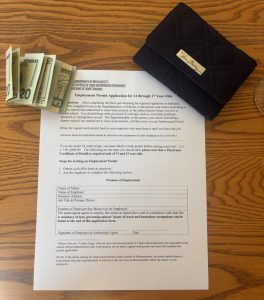Cheating students must be held accountable
Cheating students must be held accountable for their actions through harsher punishments.
May 18, 2023
Growing up, parents teach their kids the importance of academic integrity. Undoubtedly, parents also want their kids to receive good grades. But in a world of technology and the everlasting pressure to “get into a good college”, the question of whether these two can virtually coexist becomes harder and harder for some students to fathom.
It is evident that for many students, the answer is obvious: getting good grades is more important. Indeed, it seems students have become increasingly more unscrupulous in their methods to succeed, even if it means cheating.
This has especially been the case during COVID, when record numbers of students would cheat during online schooling. According to N.P.R. News, in colleges like the University of Georgia and Ohio State University, cheating more than doubled during the pandemic year of 2021. Among the ways students would cheat was by sharing answers though online chats and looking up answers on websites. Though the pandemic has been declared officially over by the World Health Organization, cheating, it seems, is far from it.
In my own classes, I have seen how cheating has infiltrated the classroom now that the school year is near its end, and it is astounding. Surrounded by hardworking and ambitious students, I find it hard to believe that they feel the need to share their answers on a test, or use ChatGPT, an AI chatbot, on an essay.
My first reaction was utter shock; I could not help but question my perception of the people around me and how wrong I was to believe that getting high grades comes so naturally to them. Suddenly, all of those moments where I felt inadequate for getting a problem wrong on a test while comparing myself to others seemed silly.
But out of the wave of emotions that hit me, the one that plagued my consciousness the most was frustration. Hard-working students deserve a fair classroom environment, and cheaters should not be allowed to go on for so long without serious repercussions.
It seems like every time a teacher catches a student cheating, the student may get a visit to the dean, followed by a lowered grade. According to the student handbook, this is the punishment given to students who cheat in the first offense. When it comes down to plagiarism, teachers often look at a portion of the essay that was plagiarized and simply take the percent of the paper that was copied off of the final grade.
Though this strategy is fair, considering how some students who plagiarize do end up writing some of the paper, a lower grade does not carry as much weight as a zero. The students affected may feel upset for a little while, but eventually, their single bad grade evens out with the rest. When that occurs, they no longer feel guilty about what they have done and may continue cheating. This is why teachers should consider giving those students an outright zero, which is considered a second offense in the student handbook.
Something else that I have noticed my teachers do is make tests harder than they originally were as a way to combat the cheating that occurs. However, it is frustrating to see how the entire class is being punished for something that only a few people have done. Not only that, but students who did not cheat now have to spend a significantly longer time studying, with their test-taking stress only increasing.
By punishing the whole class and changing the test, teachers are sending the wrong message. Instead of feeling remorse about what they did, students who cheated feel empowered to cheat once more. They receive the false impression that they can get away with anything, as there are no real consequences. If it does not individually impact them, why would they care if the whole class is being punished?
While changing the test to avoid cheating is understandable, teachers already have enough on their hands and should not feel the need to change their entire plans in order to accommodate the cheaters. Instead, they should focus on punishing cheaters individually. Although that is not an easy task, from an emotional and equitable standpoint, there are times where punishment is necessary.
One of the reasons why it is so important to punish students is because it is better to suffer the consequences early on in high school, rather than in college. According to an article by U.S. News & World Report, when students cheat in college, they may get a zero on the assignment and fail the class, or even be suspended. The cheating then goes on their permanent record, and if a student gets suspended from one college, it is significantly harder to get into another college.
If students in high school suffered similar consequences now, there would be significantly less students willing to put their futures on the line. Though these consequences may seem extreme, maintaining academic integrity is more important than avoiding punishment.
If we allow cheaters to continue as they are, they will not grow up to be fulfilled or morally driven human beings. Cheating may only be the start for some students, threatening to lead them onto other, even more unethical paths in life.
When it comes down to it, cheating is a matter of morality and principle; never mind the lower grade–students need to realize that cheating is wrong, no matter the circumstance. To do that, teachers must hold them accountable for their actions. Parents and students should also be there to support teachers in making these tough decisions, even if it involves their own.








